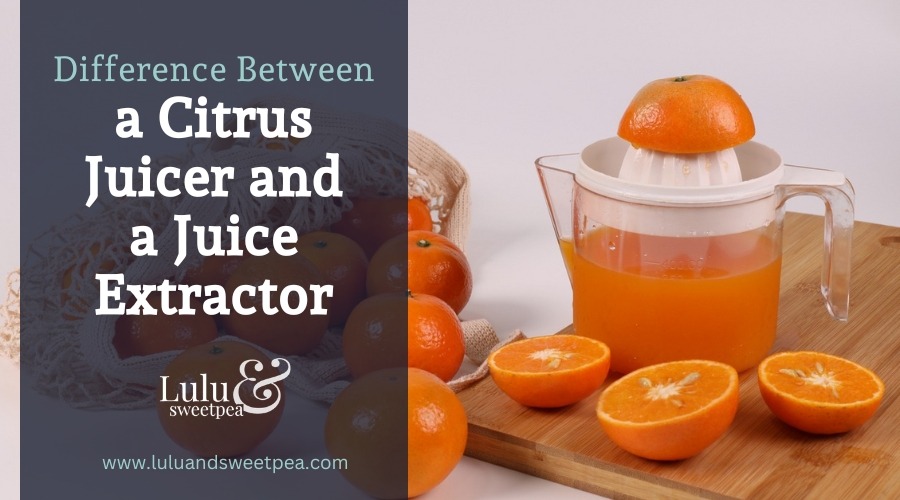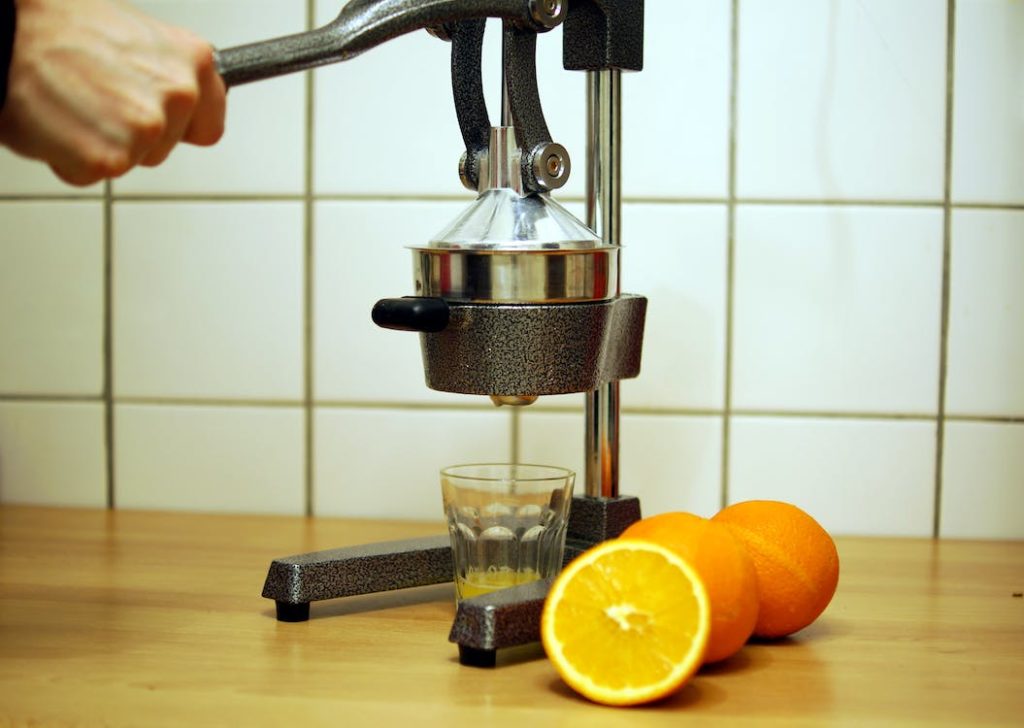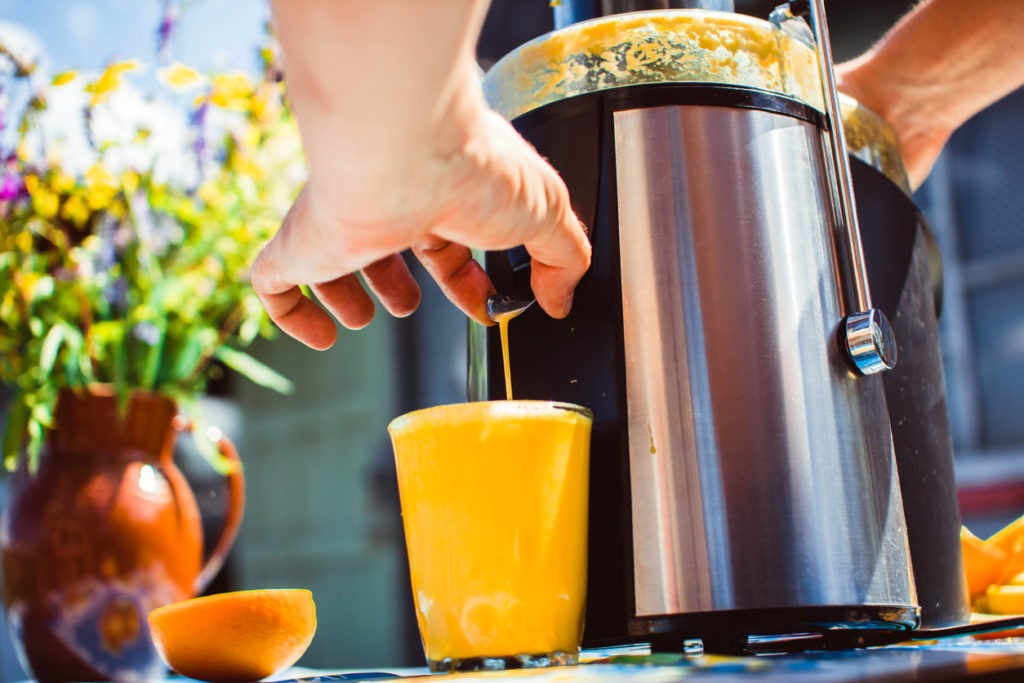Although juicers and extractors are similar in many ways, they are not identical. A juicer basically provides juice from citrus fruit. In the process of generating juice, the entire fruit is not crushed and separated into its shell, seeds, and pulp.
While an extractor segments the fruits and veggies. The machine then rotates quickly enough to separate liquid or juice from pulp and husk.
Now let’s delve into a full explanation of the distinction between a juicer and an extractor.
Juicer
A juicer is a device used to extract citrus fruit juice. Citrus is masticated by the juicer in order to extract fresh juice. A standard juicer does not differentiate between liquid, puree, and coating. To produce the juice, the entire fruit is mashed.
Citrus Squeezer
This is a specific sort of juicer for citrus fruits. It features a single cone-shaped head that revolves slowly. The head of the citrus juicer is shaped as a spinning cone. You must halve the fruit before pressing the spinning head over it to collect the juice.
The citrus juicer is less expensive than the juice extractor because it lacks the latter’s many functionalities.
Manual Fruit Juicer
The manual juicers extract fruit juice with the use of mechanical force. Electricity is unnecessary. These juicers should be at the top of your shopping list.
However, the head of these manual citrus juicers is shaped like a cone. Through this cone-shaped head, any eligible fruits can be squeezed. It collects all of the juice in a glass.
Electric Citrus Juicers
The electric citrus juicer is a small equipment for preparing fresh juice at home. When pushed with force, it spins and crushes the fruit to release juice.
Juice Extractor
A juice extractor is a device for slicing fruits and vegetables into several pieces. It has an inner cutting edge for shredding fruits and vegetables. As the fruit or vegetable rapidly rotates, its skin, purée, and seeds are immediately separated, leaving only refined juice. The pure juice is collected in an individual container. The juice extracted by the juice extractor is more refined and refined than juice extracted by the juicer. There are two common types of juice extractors used in the household. There are two types of juice extractors: masticating and centrifugal.
Centrifugal Juice Extractor
Centrifugal juicers have a single blade that slices and dices food at high speed, allowing the juice to flow freely. Essentially, it functions similarly to a blender.
Masticating Juice Extractor
Masticating juicers utilize gears rather than blades and ground food rather than slicing it. Some masticating juicers have only one gear and grind food against nearby hard surfaces, whilst others crush food between two gears in a manner similar to a meat grinder.
Comparison of the Methods of Operation Between a Juicer and an Extractor
1. Food Wastage
Centrifugal juicers produce far more food waste than masticating juicers. Centrifugal juicers cannot break down food as efficiently as masticating juicers. The spinning blades of a centrifugal juicer do extract juices from food, but they do not employ the squeezing motion of a masticating juicer.
Numerous users have complained about the food waste generated by centrifugal juicers. They must purchase a significant quantity of fruits and vegetables in order to prepare a single glass of juice. Using a masticating juicer, the same amount of fruits and vegetables would yield between one and a quarter and one and a half glasses of juice.
Given how different citrus juicers are, it is difficult to compare them. When citrus fruits are broken down by these juicers, they generate as much food waste, if not more, than other types of juicers. Due to the inability of citrus juicers to process other fruits and vegetables, it is difficult to draw a fair comparison.
2. Prep Time
Although centrifugal juicers have lagged behind masticating juicers thus far in this essay, prep time is when they begin to gain ground. Large food bits can be placed inside centrifugal juicers to expedite the juicing process. In fact, if the feeding tube’s mouth is large enough, you may frequently insert an entire apple at once. Consequently, juicing with a centrifugal juicer requires minimal or no preparation time.
Masticating juicers, on the other hand, will become clogged if you attempt to use huge chunks. In fact, jamming the gears of a low-quality masticating juicer could result in the gears being broken. Jamming a masticating juicer and consequently destroying its gears can be a costly error. Therefore, masticating juicers require significantly more preparation time. Prior to juicing your fruits and veggies, you must first cut them into little pieces.
Preparing citrus fruits for use in a citrus juicer requires minimal time. To begin, you need only cut them in half and lay one half on top of the reamer.
3. Velocity versus Quality
Since centrifugal juicers slice food rather than grind it, they are considerably more efficient than masticating juicers. If you’ve ever seen a late-night infomercial for juicers in which the host rapidly drops in apple after apple, you can bet that they were demonstrating the speed of a centrifugal juicer.
Always, speed appears to be the greatest option. In today’s day of microwaves and high-speed internet, many feel that whatever works the fastest must be the most effective. As long as you are juicing soft things like grapes and strawberries, you should be able to handle the speed of a centrifugal juicer just well.
However, if you intend to juice tough items such as carrots and apples, you must recognize that faster is not necessarily better. It takes much longer for masticating juicers to extract juice from food because they work so hard to break down the meal. In contrast to masticating juicers, centrifugal juicers frequently leave behind a substantial amount of food waste and produce only a little amount of juice. Occasionally, it is necessary to take the time to do things properly.
4. Noise Factor
Typically, centrifugal juicers generate significantly more noise than masticating juicers. I assume that noise is the cost of velocity. Because a centrifugal juicer’s blades must revolve so rapidly, the engine and action produce a great deal of noise. The gentle movements and gear mechanism of a masticating juicer are typically considerably quieter.
5. Additional Uses
Numerous masticating juicers can also produce sorbet, ice cream, and baby food. Even butter and milk can be produced from many types of nuts. These options are unavailable when using centrifugal and citrus juicers. Consider acquiring a masticating juicer if you intend to use your juicer for these purposes.
6. Cost
Masticating juicers are often two to three times more expensive than centrifugal juicers. Nevertheless, a masticating juicer may be worth the investment if you need to juice tough foods or plan to use it for extended durations. You would likely break your centrifugal juicer and buy two or three replacements before discovering that you would have saved money by acquiring a masticating juicer in the first place.
The pricing of higher-end centrifugal juicers and lower-end masticating juicers are comparable. However, I urge you against purchasing an item just on its price. There are significant distinctions between centrifugal and masticating juicers. It is preferable to purchase a juicer based on its functionality rather than its price. The price of any juicer, centrifugal or masticating, will also be heavily influenced by the motor’s horsepower. Read my essay on wattage for additional details.
Citrus juicers are the least expensive form of juicer by a wide margin. I would never find a citrus juicer useful, as I use my juicer to extract juice from a wide variety of fruits and vegetables. However, if you just intend to use your juicer for citrus juices, why spend more money on a more expensive model?
Conclusion
Many believe there is no difference between the terms juicer and juice extractor because a juicer is the device that extracts the juice from fruits and vegetables. It is simply a matter of semantics. However, some argue that a simple juicer would not distinguish between pulp, skin, seeds, and juice and would instead pulverize the entire fruit to make juice. A juice extractor separates juice from seeds, peel, and pulp by slicing fruit into pieces and then rapidly spinning them. This is another reason why a juice extractor costs more than a standard citrus juicer. In addition, it offers more functionality than a simple juicer.



